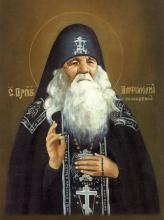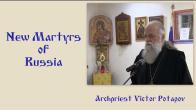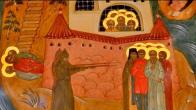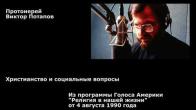You are here
Venerable St. Amphilochius of Pochaev
April 29 / May 12
 On November 27/December 10, 1894, in the Ukrainian village of Malaya Ilovitsa, Varnava and Ana Golovatiuk had a son, who at Baptism was given the name Yakov.
On November 27/December 10, 1894, in the Ukrainian village of Malaya Ilovitsa, Varnava and Ana Golovatiuk had a son, who at Baptism was given the name Yakov.
Varnava, the father of 10 children, had to take any work available: he fabricated shoe-lasts, and sleighs. Peasants would seek him out as an experienced setter of broken bones. As a youth, Yakov sometimes helped his father "restrain the patients while he set their broken bones." Yakov's natural strength and the skills he acquired in his youth stood him in good stead.
In 1912, Yakov was called into the Royal Army, where he did his compulsory service as a field medic. During military actions, he would help carry wounded companions from the field of battle. After he was captured, the Germans sent him to the Alps, where for three years he worked for a farmer. In 1919 Yakov managed to escape, and, upon returning to his native village, resumed the way of life of a peasant; he also helped the sick who turned to him for help.
In 1925, Yakov was admitted as a novice under obedience to the Pochaev Lavra. The new monk performed his assigned tasks with industriousness and humility. He constructed sleighs and wheels, sang in the choir....
On July 8, 1932, with the blessing of Metropolitan Dionisy of Warsaw and all Poland, Yakov was tonsured a monk with the name Joseph.
On September 21, 1933 Bishop Anthony ordained him a hierodeacon, and on September 27, 1936, a hieromonk.
In performing a variety of jobs and obediences at the Lavra, Fr. Joseph treated the sick; he was especially noted for his skill in setting broken bones. From all over the district, day and night, a steady stream of suffering people was brought to him for treatment. So as not to disrupt the life of the brethren of the Lavra, Fr. Joseph received the prior's blessing to move to a little house at the monastery cemetery, where he and Hieromonk Irinarch were to live for the next 20 years. Every day, the sick would come to the little house. There were days when Hieromonk Joseph would receive up to 500 people, many yearning for healing, either physical or spiritual.
The spiritual struggler dedicated his entire being to serving God. Having received from God the gifts of clairvoyance and healing, he spent his entire life helping his neighbor. His many ascetic feats and spiritual struggles, done in secret, remained hidden from the world.
After the war, the spiritual struggler miraculously avoided reprisals. It happened that one night fourteen armed men burst into his cell and demanded food; after eating, they asked that the elder escort them outside. At the gates, the commander of those partisans told him that he was to be shot. The elder took the news of imminent death with utter humility. He asked only that he be given ten minutes to pray. He had managed to read the "Our Father," "O Theotokos" "I believe," and had begun reading the prayer for the departure of the soul, when suddenly Fr. Irinarch, distraught over the elder's long absence, came running. When he saw the machine gun pointed at the righteous one, he did not think [of the consequences to him] but leapt, knocking the gun to the ground, and began to plead for them to show mercy to the elder… The threat of death passed.
In the late 1950s, Khrushchev’s persecution of the Church began. Throughout the land, there were massive closures of monasteries and churches. False accusations were leveled against the monastics, and they were evicted and sent to their [prior] homes and deprived of the right to return to the monasteries. In the fall of 1962, thanks to their fearless elder, the monks succeeded in defending the Holy Trinity Cathedral. "Ten militia men and their commander were standing at the gates of the church, when suddenly the elder grabbed the keys out of the commander's hands. He gave them to Augustine, the young prior, and called the local populace to defend the church. Peasants armed with poles rushed at the militia." They successfully defended the cathedral, but several days later, the elder was taken away in the middle of the night in a "black raven" to a psychiatric hospital, where he was placed in a ward for the most "agitated" psychiatric patients. They injected him with medications which caused massive edema of his entire body, and caused his skin to crack.
The priest's spiritual children wrote letters begging for the elder to be released. Three months later, he was brought to the office of the chief of medicine. He was asked whether he could heal the others in his ward. The elder said that he could heal all of them in two weeks, and asked that he be brought the Holy Gospels, a Cross, and vestments, so that he might serve a Moleben with the Blessing of the Waters. The reply was, "No, treat them without any prayer services."
The meek elder responded, "No, that is impossible. When a soldier goes into battle, he is given weapons… Our weapons against the invisible foe are the Cross, the Holy Gospels, and Holy Water."
Fr. Joseph was returned to the ward.
His sufferings ended only when Svetlana Alleluieva, daughter of Joseph Stalin, came to the hospital. Fr. Joseph had once healed her of a spiritual illness. She managed to arrange for the elder's release.
Elder Joseph returned to his home village and moved in with one of his relatives. On learning where the elder was, suffering people began to seek him out. Every day, Fr. Joseph would serve Molebens with the Blessing of the Waters, and would heal the people. The local authorities, worried at seeing a flood of sick people coming into the village, tried to turn the elder's relatives against him. One of them was persuaded by their arguments. He tricked the elder, took him on his tractor to the swamps beyond the village, and there viciously beat him, threw him into the water, and drove away. On that cold December day, the martyr lay in the icy water for eight hours. The dying elder's spiritual children found him, took him to the Pochaev Lavra, where that very night he was tonsured into the schema and given the name Amphilochius, in honor of Holy Hierarch Amphilochius of Iconium. They feared that he would not live through the night. Through God's mercy, Schema monk Amphilochius recovered. It was dangerous to remain at the Lavra without a residence permit, and he soon returned to his village. As before, people would come to the elder for healing.
Fr. Amphilochius would serve a Moleben with the Blessing of the Waters every day in his yard, and many of the faithful would be healed. Fr. Amphilochius blessed some of the sick not to eat on Wednesdays and Fridays. He directed that on strict fast days, on arising early in the morning, and before morning prayers, one should make three full prostrations, along with the prayer "O Theotokos Virgin, rejoice," so as to easily endure that day's fast.
One needed to have enormous love in one's heart in order to never deny anyone [any request]. That Elder of God possessed such love. He found time for everyone.
The ascetic departed for the Lord on January 1, 1971. On April 23, 2002, Pochaev Elder Schema-abbot Amphilochius was glorified as a saint.
Address of our Cathedral
Subscribe to our mailing list
While all the materials on this site are copyrighted, you may use them freely as long as you treat them
with respect and provide attribution on the Russian Orthodox Cathedral of St.John the Baptist of Washington DC.









